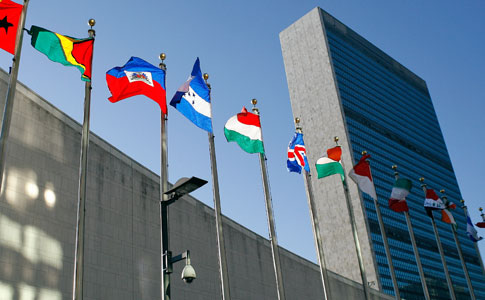NOTE: This post was written by Elaina Estrin, one of the School of Diplomacy’s two UN Youth Representatives. Elaina is a student majoring in Diplomacy and International Relations and Modern Languages. Elaina’s focus is on international organizations and post conflict state building. She is fluent in English and Russian and she will be continuing her Arabic language studies in Muscat, Oman this upcoming summer. Elaina has interned with the office of Senator Bill Pascrell (D-NJ) and taught English in Petrozavodsk, Russia. She has also worked closely with a DC based consulting firm called Field Strategies. Currently she is the head of Public Relations of SHU’s Slavic Club and Secretary for SHU’s International Law Society. Ms. Estrin is pictured on the front page of the blog with ECOSOC President Martin Sajdik.
There are 1.8 billion young people scattered across the globe; we make up a huge portion of the world’s population and we are a force to be reckoned with. The United Nations Economic and Social Council recognizes this, and on February 2nd and 3rd it held its annual Youth Forum titled “Youth Engagement in the Transition from MDGs to SDGs: What will it take?” Inclement weather was unable to stop the huge group of educated young minds from coming together along with member state representatives to discuss the Millennium Development Goals and their transition into the Sustainable Development Goals.
Throughout the event, social media was exploding with pictures and direct quotes from panelists were on twitter moments after being said. This gathering left quite a strong message for us all: it is not a matter of how youth should and will be involved in policy making, but rather how we will make educated decisions. Having access to events such as this one are crucial for us to have learned opinions on relevant topics, which included unemployment, the European recession, education reform, climate change, health, gender equality, and youth engagement in politics and social development.
During the opening session, U.N. Secretary General Ban Ki-moon showed the importance of including the youth in decision making saying we are the “first generation with the potential to end poverty and the last generation to avoid the worsening effects of climate change.”
The panel on youth participation in Africa did a great job in displaying the need to involve youth in governance specifically in Africa where the youth consists of 75% of the population. Vivian Onano, one of the most unforgettable panelists in attendance, hails from Kenya, and she started off her introduction stating: “I am the first girl in my community with a college degree and this deserves no applause in the 21st century, where education is a basic human right.” The 17 year old panelist Melissa Ruvimbo Kubvoruno brought up that by the 7th grade, you rapidly start seeing the number of kids in school in Africa decrease because after primary education kids must pay for schooling. The girls in these rural communities need to understand that they can be more than just wives, that even after these young women become pregnant they can still have a future beyond being mothers.
The energetic Al Jazeera journalist Femi Oke moderated the panel on Gender Equality and Youth. The main topic was the Beijing Platform for Action which brought women’s empowerment to the forefront. An essential tenant of sustainable development is creating new opportunities for girls, whether it is through education, job training or protection of their human rights. A variety of opinions were presented in the panels. While some panelists found that concentrating specifically on mothers would benefit the sons and daughters of the future, others believed that a huge part of women’s rights should focus on men. Panelist and Yale’s Associate Director on Africa, Rachel Nyaradzo Adams, spoke to me privately saying: “Anyone can be a peacemaker, but when we perpetuate exclusionary models we excel what we are trying to stop.” She went further on to explain that women are often directly impacted in times of conflict so they relate better to peace, however that does not mean we shouldn’t promote men and women alike.
The final session of the forum was dedicated to National, Regional and Global processes. People all over the world have been using the internet to spread their opinions, give expertise, and organize mass demonstrations. Young people have started campaigns to gain representation everywhere from their local government to the international agenda. During this session they were able to hear from contributors of national, regional and global processes and initiatives relevant to the post 2015 negotiations. Panelist Alejo Ramirez, Secretary General of the Ibero-American Youth Organization, regarded the immediate need for reform, stating there are “too many Governments representing NGOs and too many NGOs representing Governments.” The First Global Forum on Youth Policies hosted by the government of Azerbaijan brought together over 700 participants from different ends of the policy spectrum and resulted in Baku creating a commitment to its youth. Also, the First IPU Global Conference of Young Parliamentarians was discussed by Marija Lugaric from the Croatian Parliament. She talked about the need to have open politics and the need for more young people in Politics because “If you are mature enough to elect, you are mature enough to be elected.”
Overall the conference addressed many issues that directly impact the youth and anyone who have benefited to listen to the different panels. As Marija Lugaric stated, for participants to make this dialogue sustainable a two day forum is not enough. There is still much improvement to be made and it can begin by holding these events on a national level and holding government accountable!
